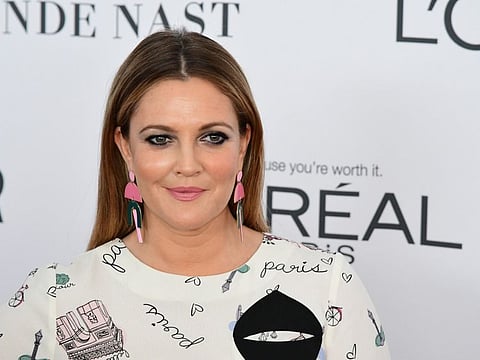Drew Barrymore says she was ‘gaslit’ into believing Woody Allen’s take on allegations
Barrymore starred in Allen’s 1996 romantic comedy ‘Everyone Says I Love You’

Actress Drew Barrymore opened up this week about working with disgraced filmmaker Woody Allen in a candid interview with Allen’s adopted daughter, Dylan Farrow, who has accused her father of sexually abusing her as a child.
On Monday’s episode of “The Drew Barrymore Show,” the host and her guest discussed “Allen v. Farrow,” HBO’s four-part docuseries re-examining writer Dylan Farrow’s long-held claim that the director molested her.
Allen has repeatedly denied the allegation and denounced the HBO investigation, which includes powerful interviews with Dylan Farrow, her mother, Mia Farrow, and more, as well as court documents, home videos and excerpts from Allen’s work that overwhelmingly paint the Oscar winner as a sexual predator.
“I want to say, first out of the gate ... that I would like to explain myself,” said Barrymore, who starred in Allen’s 1996 romantic comedy, “Everyone Says I Love You.” “This is not about me, but I wanted to have this type of candour. I worked with Woody Allen ... and there was no higher career calling card than to work with Woody Allen.
“And then I had children, and it changed me, because I realised that I was one of the people who was basically gaslit into not looking at a narrative beyond what I was being told,” she said. “And I see what’s happening in the industry now, and that is because of you making that brave choice. So thank you for that.”
While listening to Barrymore, Dylan Farrow blinked back tears. Despite her accusation — which dates back to 1992, when she was 7 years old — many prominent stars have continued to appear in Allen’s films over the years. (Though several have since spoken out against him and vowed never to work with him again.)
“Thank you,” Dylan Farrow said. “Hearing what you just said, I’m trying not to cry right now. It is just so meaningful because it’s easy for me to say, ‘Of course you shouldn’t work with him. He’s a jerk. He’s a monster.’ But I find it incredibly brave and incredibly generous that you would say to me that my story and what I went through was important enough to you to reconsider that.”
Investigative journalist Ronan Farrow and tech executive Fletcher Previn also contributed to the HBO programme on their sister’s behalf — a gesture that stunned Dylan Farrow while the series was in development.
“When my mom agreed to be interviewed, I was really, really shocked,” Dylan Farrow told Barrymore. “And when Ronan agreed, I was even more shocked. And then Fletcher agreed, and I was ... picking my jaw up off the floor.
“Gradually, more and more of my siblings signed on, and a few of them didn’t, and I’ve spoken to them about that too, and I respect that decision as well. ... But there was communication, and interestingly, the documentary has led to greater communication between us as a result.”
When asked by Barrymore why she hadn’t expected her family to participate, she explained that she and her loved ones “wouldn’t talk about [the alleged abuse] to each other” even in private, so the idea of them addressing it publicly was “absolutely incomprehensible.”
The actor and author, whose next young adult fantasy novel is slated for release in 2022, also addressed disturbing, never-before-seen footage from the docuseries of her 7-year-old self describing a moment during which Allen allegedly touched her “privates.”
Dylan Farrow said she was initially hesitant to surrender the personal video to acclaimed documentarians Kirby Dick and Amy Ziering, who eventually persuaded her to let them show it in “Allen v. Farrow.”
“I watched the entire thing as though I was watching someone else,” Dylan Farrow said. “Just a little girl who looked kind of like me, who sounded kind of like me. And I just completely dissociated from it. ... And a week went by ... and it just hit me. Everything from the tape punched me right in the face.
“And I was sobbing uncontrollably for a couple of days ... about what I saw and trying to mentally reconcile the fact that that little girl on the tape was me, and she was talking about something that happened to me. And it was overwhelming. It’s very difficult, sometimes, to know that that part of me is such a dark, painful place.”
Like Barrymore, Dylan Farrow added that becoming a mother had given her new purpose and perspective that had helped her process some of her trauma — trauma that she doesn’t want to pass down to her own daughter.
“Being a parent has given me a clarity of being able to step outside of all the craziness in my brain and examine myself as, who do I want this person to be that my little girl is going to see, looking up to for her entire life.
“I want her to think, ‘My mom was a fighter.’ And I want her to think, ‘My mom never gave up. And my mom didn’t let crappy people bring her down. She stood up to people. She stood up for the things that she believed in, the things she thought was right. And I want to be that person too.’”
Sign up for the Daily Briefing
Get the latest news and updates straight to your inbox








